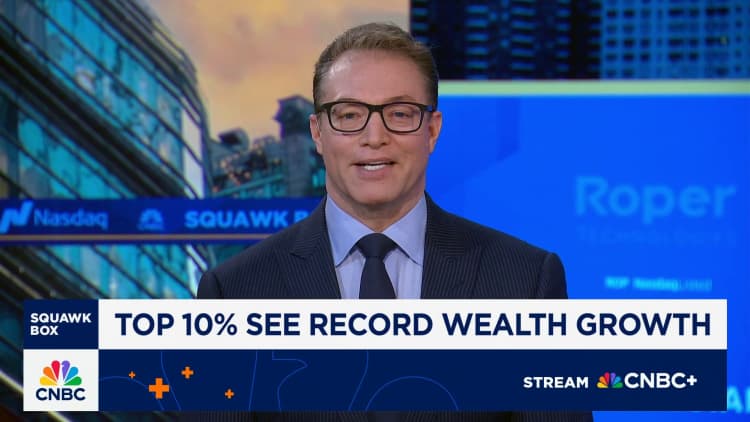Technology
Top 1% Amass Record Wealth of $52 Trillion Amid Market Surge

The wealth of the top 1% of Americans has reached a historic high, totaling $52 trillion in the second quarter of 2025. This increase comes as a result of a robust stock market, which has significantly benefited the wealthiest investors. According to recent data from the Federal Reserve, the top 10% of Americans, those with a net worth exceeding $2 million, added $5 trillion to their wealth during this period, bringing their total to $113 trillion.
This surge in wealth is part of a broader trend that has seen the top 10% gain over $40 trillion since 2020. While all wealth brackets saw gains over the past year, the most substantial increases were concentrated among the wealthiest. Specifically, the top 1% experienced a wealth increase of $4 trillion, accounting for a 7% rise in their net worth. Meanwhile, the top 0.1% witnessed a remarkable 10% growth in their wealth, nearly doubling to over $23 trillion since the onset of the pandemic.
The distribution of wealth remains a concern, despite these gains. The top 1% held 29% of total household wealth in the second quarter, compared to 28% in 2000. In contrast, the bottom 90% now controls only 33% of total household wealth, a figure that underscores the widening economic divide.
Stock Market Growth Fuels Wealth Accumulation
The primary driver of this wealth accumulation among the affluent has been the rising stock market. The combined value of corporate equities and mutual fund shares held by the top 10% increased from $39 trillion to over $44 trillion within a year. This demographic now holds more than 87% of all corporate equities and mutual fund shares.
Additionally, the number of ultra-high-net-worth individuals in the United States—those with a net worth of at least $30 million—rose by 6.5% in the first half of 2025, following a remarkable 21% surge the previous year, according to a report from Altrata. Currently, there are 208,090 ultra-high-net-worth individuals in the U.S., accounting for 41% of the global total.
The growing wealth at the top has resulted in a bifurcated consumer economy, with the affluent contributing an increasing share of overall spending. Consumers in the top 10% accounted for 49.2% of consumer spending in the second quarter, the highest level recorded since 1989, according to Mark Zandi at Moody’s Analytics. This trend has led to what some economists describe as a “K-shaped economy,” where different segments of the population experience divergent economic trajectories.
Risks of Economic Inequality
Despite the robust performance of the economy, the heavy reliance on the spending of the wealthy poses potential risks. Zandi warns that a significant downturn in the stock market, which has been the main source of wealth gains for the affluent, could have widespread negative effects. He stated, “The economy is being powered in big part by the spending of the extraordinarily well-to-do, who are cheered by the surging value of their stock portfolios. If the richly valued stock market were to stumble, for whatever reason, and the well-to-do see more red on their stock tickers than green, they will quickly turn more cautious in their spending, posing a serious threat to the already fragile economy.”
As the wealth gap continues to widen, the implications for the broader economy remain a critical area of concern for policymakers and economists alike. The ongoing trends highlight the need for careful monitoring of economic indicators and the potential risks associated with concentrated wealth.
-

 Technology5 months ago
Technology5 months agoDiscover the Top 10 Calorie Counting Apps of 2025
-

 Health3 months ago
Health3 months agoBella Hadid Shares Health Update After Treatment for Lyme Disease
-

 Health3 months ago
Health3 months agoErin Bates Shares Recovery Update Following Sepsis Complications
-

 Technology4 months ago
Technology4 months agoDiscover How to Reverse Image Search Using ChatGPT Effortlessly
-

 Technology1 month ago
Technology1 month agoDiscover 2025’s Top GPUs for Exceptional 4K Gaming Performance
-

 Technology3 months ago
Technology3 months agoElectric Moto Influencer Surronster Arrested in Tijuana
-

 Technology5 months ago
Technology5 months agoMeta Initiates $60B AI Data Center Expansion, Starting in Ohio
-

 Technology5 months ago
Technology5 months agoRecovering a Suspended TikTok Account: A Step-by-Step Guide
-

 Health4 months ago
Health4 months agoTested: Rab Firewall Mountain Jacket Survives Harsh Conditions
-

 Lifestyle5 months ago
Lifestyle5 months agoBelton Family Reunites After Daughter Survives Hill Country Floods
-

 Health3 months ago
Health3 months agoAnalysts Project Stronger Growth for Apple’s iPhone 17 Lineup
-

 Technology4 months ago
Technology4 months agoHarmonic Launches AI Chatbot App to Transform Mathematical Reasoning





















